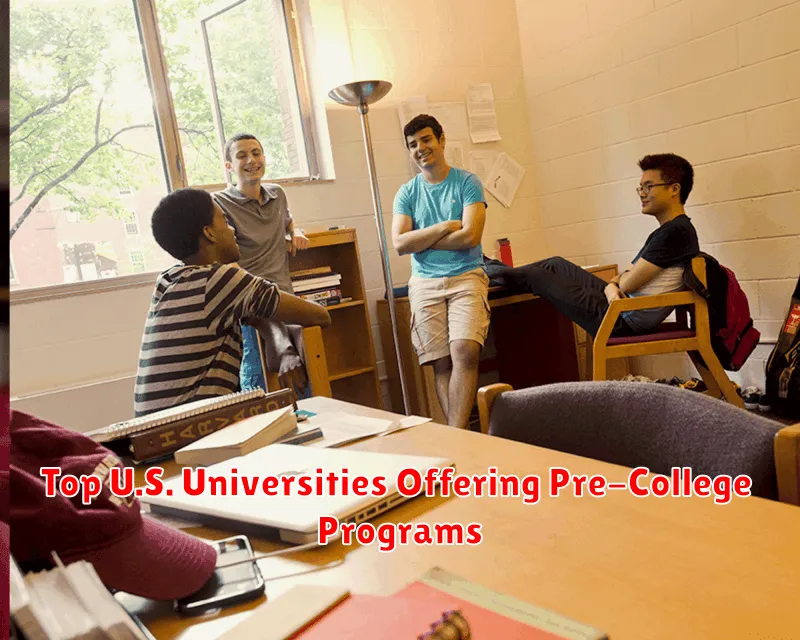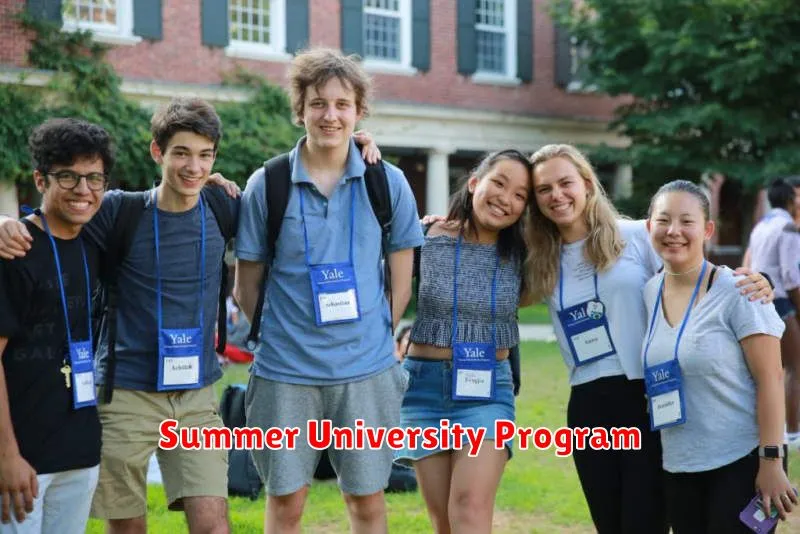As summer approaches, high school students and their parents are increasingly on the lookout for enriching experiences that will set the stage for future academic success. Top Summer Programs for High School Students at Universities offer unparalleled opportunities for young scholars to dive deeper into their interests, engage with university-level faculty, and experience the vibrant campus life. Whether it’s building foundational skills, exploring advanced topics, or networking with like-minded peers, these programs are designed to expand horizons and foster transformative educational journeys. Discover the most sought-after programs that promise to be the pivotal experiences in shaping tomorrow’s leaders.
Why Summer Programs Matter for College Admissions
In the competitive landscape of college admissions, summer programs offer high school students unique opportunities to enhance their applications. Participating in a focused program demonstrates commitment to learning beyond the school year, showcasing a student’s dedication to personal and academic growth.
These programs allow students to explore their interests in depth, providing a glimpse into university-level coursework and life on campus. Through this experience, students gain valuable skills and insights that can be highlighted in their college essays and interviews, helping them stand out to admissions officers.
Moreover, summer programs often provide networking opportunities with peers and faculty, establishing connections that can benefit students in future academic pursuits. Recognizing the value of such programs, colleges see applicants who partake in them as proactive in seeking educational enrichment, a trait highly regarded in competitive admissions processes.
Top U.S. Universities Offering Pre-College Programs

High school students seeking a taste of college life and intellectual enrichment during the summer may find pre-college programs offered by top U.S. universities to be an exceptional opportunity. These programs are designed to provide a comprehensive experience that combines both academic and personal growth.
Harvard University, for instance, offers a distinguished pre-college program that immerses students in college-level courses and collaborative projects. Participants can explore diverse fields from science to the arts, all under the guidance of Harvard’s esteemed faculty.
Stanford University also provides pre-college experiences through its Summer Institutes, focusing on innovation and leadership. Students have the chance to engage in hands-on learning and develop their critical thinking skills within a vibrant academic community.
Additionally, Yale University presents an exclusive platform for high schoolers to probe subjects such as engineering, social sciences, and more. Yale’s program emphasizes a strong sense of community and encourages students to challenge themselves intellectually.
At the University of Pennsylvania, the pre-college program known as the Penn Summer Academies covers specialized topics that amplify philosophical reasoning and scientific inquiry, preparing students for their future academic journeys.
These universities not only provide students with rigorous academic challenges but also foster an environment of growth, instilling confidence and enhancing the students’ outlook towards higher education. Participating in such pre-college programs allows students to make the most of their summer break while experiencing the vibrant college atmosphere first-hand.
STEM, Humanities, and Leadership Tracks Available
Universities across the nation offer a range of stimulating summer programs designed specifically for high school students. Among these, programs focusing on STEM (Science, Technology, Engineering, and Mathematics), Humanities, and Leadership are notably popular and influential in shaping students’ futures.
The STEM track is ideal for students with a strong interest in the sciences and technology. Participants engage in hands-on workshops and research projects, often working alongside renowned university faculty. This track not only enhances problem-solving and analytical skills but also provides insight into potential careers in STEM fields.
For those drawn to literature, history, and social studies, the Humanities track offers a deep dive into these subjects. Students explore critical thinking and cultural analysis, gaining perspectives that prepare them for a range of academic and professional pursuits. The curriculum often includes discourse-based learning and exposes students to pivotal societal themes.
The Leadership track trains students in essential leadership and communication skills, preparing them for future roles in various sectors. This track typically features interactive sessions, such as leadership workshops, team-building activities, and public speaking exercises, helping students build confidence and strategic thinking abilities.
These tracks not only enrich high school students’ educational experiences but also position them for success in higher education and beyond. By participating in these rigorous programs, students have the opportunity to explore and develop their interests in a university setting.
Application Process and Deadlines
The application process for summer programs at universities typically involves several key steps. Students must complete an online application form, which often includes submitting personal information, academic records, and proof of extracurricular activities.
Many programs require a personal statement or essay that outlines the applicant’s reasons for wanting to attend the program and what they hope to achieve. Some universities might also ask for recommendation letters from teachers or mentors.
Deadlines can significantly vary across different programs, but it’s crucial for students to submit all materials well before the due date to ensure consideration. Most program deadlines fall between February and April, though some might be as early as January.
Additionally, competitive programs may have an early application deadline, which might offer students a better chance at acceptance. It is important to check each university’s specific requirements and deadlines to avoid missing out on these opportunities.
How to Choose the Right Program Based on Interests
Choosing the right summer program that aligns with your interests is crucial for making the most out of your educational experience. Start by identifying your personal interests and career aspirations. Consider topics that engage you, whether it’s science, technology, arts, or humanities.
Next, research universities offering programs in your area of interest. Look for specific courses or workshops that deeply explore your chosen subject. Review past program curriculums to understand what skills and knowledge you will acquire.
Evaluate the program’s structure, including the balance between theoretical learning and practical application. This ensures a well-rounded experience. Seek feedback from previous participants to gain insights into the program’s effectiveness and real-world applicability.
Lastly, consider the program’s duration and how it fits into your summer schedule, ensuring you have adequate time to engage fully. Aligning the program with your interests and logistical preferences will provide a rewarding and enriching summer experience.
Costs and Scholarship Opportunities for Summer Study
Participating in top summer programs at universities can be a transformative experience for high school students, but the cost may present a significant consideration. Tuition fees for these programs vary widely, often influenced by factors such as the duration of the program, the university’s reputation, and the specific resources offered during the study.
On average, students might expect to invest several thousand dollars, which would typically cover academic instruction, accommodation, and meals. However, scholarship opportunities are often available to ease this financial burden. Many universities offer merit-based and need-based scholarships to help qualified students attend these enriching programs.
Applicants are encouraged to explore such scholarships early in the application process, as deadlines may precede the program’s start date. Additionally, some universities partner with external organizations that allocate funds for summer study, providing further avenues for financial assistance. Being proactive in researching and applying for these scholarships can significantly enhance accessibility for students who might otherwise find program costs prohibitive.
Virtual vs On-Campus Summer Experiences
As high school students consider summer programs at universities, they often weigh the options between virtual and on-campus experiences. Each choice offers distinct benefits, shaping students’ academic and social journeys differently.
Virtual programs provide students with unparalleled flexibility. Participants can engage with compelling course material without the need to relocate, allowing them to balance commitments at home while accessing world-class educational resources. This format often incorporates advanced digital tools, creating interactive and engaging learning environments that can adjust to a variety of learning styles.
In contrast, on-campus experiences immerse students in the full university environment. They offer a chance to experience life away from home, fostering independence and personal growth. Living and studying in a university setting provides a unique opportunity to interact face-to-face with peers and educators, facilitating in-depth discussions and developing lasting friendships. The campus atmosphere can also expose students to diverse cultures and perspectives, essential for a well-rounded education.
Whether opting for virtual or on-campus programs, each path equips students with valuable skills and experiences, preparing them for future academic endeavors and personal development. The choice ultimately depends on individual preferences, goals, and circumstances.
Testimonials from Past Students
Attending a summer program at a renowned university can be a transformative experience, as expressed by numerous past participants. These students highlighted the enriching environment that fosters academic growth and personal development.
Jane D., a former attendee of the summer program at Harvard, stated, “The curriculum was incredibly engaging, and the faculty were always available to support and advise us.”
Likewise, Michael R. reflected on his experience at Stanford University, saying, “The summer program not only enhanced my knowledge in particular subjects but also helped me build significant life skills.”
Another participant, Sarah K., emphasized the importance of networking opportunities: “Connecting with peers from around the globe was invaluable, providing different perspectives and forming lasting friendships.”
These testimonials underscore the high regard students have for these programs, which play a crucial role in shaping their academic and professional futures.

